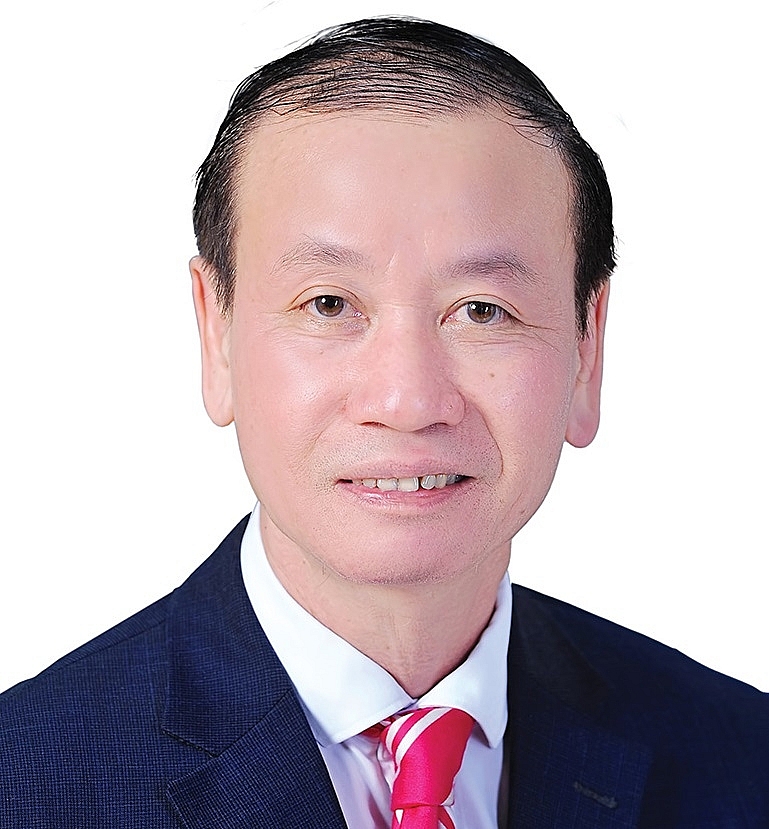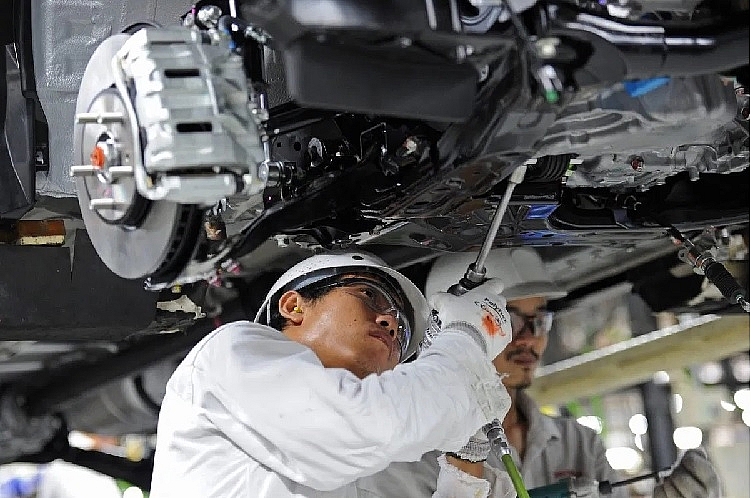Managing fresh automobile clusters for post-virus boost
 |
| Vu Tan Cong - Deputy general director Vietnam Automobile and Trade Consulting Co., Ltd. |
In addition, the pandemic has made the US-China trade dispute even fiercer. As a result, many Chinese-located automobile parts and component-manufacturing enterprises are planning to move to other countries to avoid the effects. These enterprises include tier-1 and tier-2 groups that supply their products to both China (such as Geely, Changan, Chery, and SAIC) and overseas carmakers (like Volkswagen, Toyota, Honda, Hyundai, and many more).
Vietnam has now successfully controlled COVID-19. This makes it one of the more interesting countries in terms of attracting new waves of foreign investment in the automotive support industry. Moreover, Vietnam is close to China with a long in-land border line that makes the country even more attractive for Chinese automobile supporting industrial businesses.
Vietnam has signed some free trade agreements (FTAs) such as the ASEAN Trade in Goods Agreement (required in-bloc localisation ratio of 40 per cent), the Comprehensive and Progressive Agreement for Trans-Pacific Partnership (required in-bloc localisation ratio of 55 per cent), and the EU-Vietnam FTA (required in-bloc localisation ratio of 55 per cent). In order to enjoy zero import tax rates on cars to be imported by other FTA member countries from Vietnam, the development of the automotive support industry is the key to success.
In order to take advantage of this, Vietnam needs to implement a selection of the right investment fields, establish an automobile industry cluster, and make full use of central government, local government, and business enterprise efforts.
 |
| Managing fresh automobile clusters for post-virus boost-illustration photo. Photo: AFP/Christophe Archambault |
Suitable funding fields
There are two fields of automobile supportìng industries advisable to attract foreign investment – automotive electronic component production and the material production industry.
In a passenger car, many electronic components have been used to make cars more effective, safe, stable, and comfortable. According to data from PwC, the percentage of electronics value in passenger car total value will be 35 per cent in 2020 and up to 50 per cent by 2030.
These rates show the big potential for the electonic passenger car field to develop. It is predicted that the global electronics automotive market size will exceed $300 billion this year.
In addition to this industry, material production is also a very important area for the field to develop. Materials, which are recognised as “food” for the industry, include steel alloys, aluminum alloys, cast iron, plastics, rubbers, glass and more.
In Vietnam, the material production industry for automobiles is at very low levels of development, and most of the materials necessary for the automotive industry are imported from overseas.
In order to be successful in the automobile industry, it is advisable for Vietnam to concentrate on the development of the material production industry using raw materials available in Vietnam like alumina, iron ores, natural rubbers, and oil refinery side-products.
In many countries around the world with developed automobile industries, they are recognised as high-tech sectors. In fact, passenger car electronics and material production industries involve advanced methods and the most modern equipment.
As China is the biggest automobile market of the world in sales volume, at 25.8 million units last year, most of the world automotive electronics and material production enterprises have their production bases there.
Under COVID-19 influences, those enterprises in China are planning to relocate their production bases to other countries in Asia. Vietnam needs to well prepare to welcome new waves of foreign investment in automobile electronics and material production industries.
To be successful in this, Vietnam has to better consider and set up some automobile industry clusters (AIC) in which automobile manufacturers and tier-1 and tier-2s are located. Advantages of an automobile industry cluster are increased productivity, specialised workers, retrieving investors, and rapid innovation.
A northern AIC could supply its products to VinFast, Hoa Mai Motors, and Chien Thang Motors in Haiphong city; Ford Motors in Hai Duong city; Toyota Motors, Honda Motors, and Daewoo Bus in Vinh Phuc province; TC Motors and HINO Motors in Hanoi, and the Ninh Binh TC Motors factory in Ninh Binh province.
A central AIC could supply products to the THACO and TCIE factories in Danang city. Additionally, a southern AIC can supply products to Mercedes-Benz, Suzuki, ISUZU, SAMCO, and Daehan Motors in Ho Chi Minh City; Mitsubishi Motors in Binh Duong province, and Do Thanh Auto in Dong Nai province.
Efforts from numerous sides
On May 22, the prime minister agreed to establish a special working team with new thinking to welcome waves of foreign investment and strong transition from overseas after the COVID-19 disease.
Members of this special working group are advisable to include senior officers from related ministries like those of industry and trade, finance, transport, planning and investment, and science and technology; as well as senior officers from the aforementioned cities where the automobile industry clusters would be located; and independent senior consultants/experts on automobile industry and business.
The special working group will work out and consult with the PM to promulgate special incentives and support policies on the establishment, management, and operations of the AICs. These policies (if any) must be clear, easy to implement, feasible, and attractive enough in order to boost investment in such clusters.
Special incentive and support policy contents that are expected by the industry include tax incentives (corporate income tax, personal income tax, import tax, special consumption tax); technology transfer fee support (a part or whole of the technology transfer fee); support in technology purchases; and support in contacting and working with potential foreign partners.
Meanwhile, the local governments of cities where the AICs are to be located can provide them with more incentives and support, within their responsibilities and duties.
These incentives and support from local governments consist of clean land being available for investors in the AICs; land-leasing incentives (land-leasing cost, land-leasing fee, and reduction durations); land support (no costs for land compensation and land levelling); manager and high-skilled technician training fee support; and strong support in infrastructure of the AICs (power and water supply, and solid and water waste treatment).
In addition, local governments are advisable not to create additional investment procedures, to delete all unnecessary procedures, and to support investors in arrangement of housing and/or apartments for workers, technicians, and experts at low renting fees or for free.
By working with many businesses in the automobile supporting industries, it can be seen that many of them are weak in financial capacity, poor in business and human resource management, and limited in international relations and integration.
Strong preparations by both the central and local governments will be of no value when businesses do not make enough effort. Therefore, it is highly recommended that busineses operating in the automobile supporting industries will have to arrange enough finances for investment, improve their corporate management skills, enhance international relations and integration, boost human resources, and become stronger in business-to-business connections.
| Local supporting industries remain limited, with almost all components for assembly being imported. Localised automotive parts like tubes, tyres, seats, mirrors, glasses, wires, batteries, and plastic elements still have low technological content. Up to 80-90 per cent of the main raw materials for the production of such components, like aluminum and steel alloy, plastic resin, and high-tech rubber are imported as well as moulded materials. This is costly in transport, packaging, and import taxes. The weak capacity of supporting industry enterprises is also a concern. Mould makers either do not have a large scale or lack co-ordination for development, while the casting industry precision is low with a high rate of defects not up to standard. The lack of coherent government automotive policies over time, combined with incentives considered weak by completely-knocked down (CKD) assemblers and poor supplier presence, has resulted in a local manufacturing environment in Vietnam less attractive for automakers than other ASEAN countries. Because multinationals invest in projects producing vehicles in large scale within the ASEAN, the Ministry of Industry and Trade (MoIT) estimates that Vietnam’s market size is equal to one-tenth of Thailand’s and one-fifth of Indonesia’s. Therefore foreign-invested, large-scale investment projects are unlikely to take place in Vietnam. Thus, the MoIT focuses on supporting domestic projects like THACO, Thanh Cong, and VinFast to increase automobile production and assembly. Decree No.125/2017/ND-CP dated November 16, 2017 on amending and supplementing a number of articles for the preferential import tax, which took effect in 2018, applies zero per cent import duty on CKD components that cannot be produced in Vietnam for manufacturers who can achieve a high-production volume within five years. The minimum volume to qualify in 2018 was 16,000 vehicles in general, including 6,000 of a specific type at Euro 4 emission level. Amongst local assemblers and manufacturers, THACO, Toyota Vietnam, Ford Vietnam, and Hyundai Thanh Cong are the only four major automobile companies that may qualify. Source: Vietnam Business Forum |
What the stars mean:
★ Poor ★ ★ Promising ★★★ Good ★★★★ Very good ★★★★★ Exceptional
 Tag:
Tag:
Related Contents
Latest News
More News
- NAB Innovation Centre underscores Vietnam’s appeal for tech investment (January 30, 2026 | 11:16)
- Vietnam moves towards market-based fuel management with E10 rollout (January 30, 2026 | 11:10)
- Vietnam startup funding enters a period of capital reset (January 30, 2026 | 11:06)
- Vietnam strengthens public debt management with World Bank and IMF (January 30, 2026 | 11:00)
- PM inspects APEC 2027 project progress in An Giang province (January 29, 2026 | 09:00)
- Vietnam among the world’s top 15 trading nations (January 28, 2026 | 17:12)
- Vietnam accelerates preparations for arbitration centre linked to new financial hub (January 28, 2026 | 17:09)
- Vietnam's IPO market on recovery trajectory (January 28, 2026 | 17:04)
- Digital economy takes centre stage in Vietnam’s new growth model (January 28, 2026 | 11:43)
- EU Council president to visit Vietnam amid partnership upgrade (January 28, 2026 | 11:00)






















 Mobile Version
Mobile Version